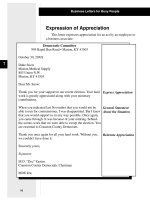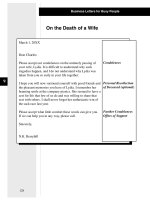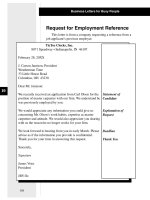Business Letters for Busy People part 3 doc
Bạn đang xem bản rút gọn của tài liệu. Xem và tải ngay bản đầy đủ của tài liệu tại đây (79.67 KB, 10 trang )
8
In a Nutshell
Writing a business letter need not be difficult as long as you
remember that you are communicating with another business
person just like yourself. If you incorporate Subject, Audience,
Purpose and Style/Organization into your correspondence, you
will be on the road to better business letter writing.
Business Letters for Busy People
1
TEAMFLY
Team-Fly
®
HAPTER 2
C
Parts of a Business Letter
9
There are many parts to the business letter — some
required, some optional. This chapter will review those parts
and their order. The parts of the business letter follow:
1. Letterhead or Heading
2. Date
3. File Number (optional)
4. Confidential (optional)
5. Inside Address
6. Attention Line (optional)
7. Salutation (optional)
8. Subject Line (optional)
9. Body of the Letter
10. Complimentary Close (optional)
11. Signature
12. Added Information (optional)
13. Postscript (optional)
14. Mailing Instructions (optional)
2
10
Letterhead
Most business letters originating from a firm are written on the
firm’s letterhead. If you are writing a personal business letter or
your firm does not use letterhead, then you need to include your
firm’s address in the heading (see Chapter 3 for the various
formats).
Date
When you are using a heading instead of letterhead, place the
date on the first line and the address on the subsequent lines as
follows:
September 9, 20XX
359 Longview Road
Mt. Vernon, IL 65676
This should be the date the letter is written (see Chapter 3 for
placement in the various formats). Be sure to write out the month
and to include both the date and year for adequate reference.
File Number
On occasion, you may wish to include the file number of the
project, case or order that the letter refers to. The file number
should be physically separated from the date by two spaces and
from the part that follows (Confidential or Inside Address) by two
spaces.
Confidential
Use this word when the person to whom the letter is addressed
is the only one who should read the letter. Physically separate the
word from the rest of the letter by two lines. To assure
confidentiality, include the word “Confidential” on the envelope.
Inside Address
This should include the name of the person you are writing to,
the person’s title (if available), the name of the firm and the firm’s
address.
Business Letters for Busy People
2
The standard
dateline in the U.S.
is month/day/year:
(March 15, 20XX).
In Europe, however,
the most widely used
format is
day/month/year:
(15 March 20XX).
2
Attention Line
This is used when you do not know the name of the person
you are writing to and the letter is addressed to the firm. For
example, the attention line may say, “Attention: Head of
Accounting.” It may also be used when you know the name of the
person you are writing to but are unsure of the title. The attention
line may say, “Attention: Customer Service,” thus indicating to the
person receiving the letter that the letter also needs to be routed to
the customer service department. Another way of doing this is to
use the attention line and send copies of the letter to the
appropriate department.
Salutation
The salutation is used in all formats (see Chapter 3) except the
Simplified Letter and the Memo. The following are salutations
used in American business letters.
• Dear Sir
• Dear Madam (May be followed by title, such as Dear
Madam Chairperson.)
• Gentlemen
• Ladies
• Dear Mr. Bryan
• Dear Ms. Gray
• Ladies and Gentlemen
• Dear Personnel Director (a gender-free title)
• To Whom It May Concern or TO WHOM IT MAY
CONCERN (Use this form as a last resort.)
Caution: You must determine the appropriate choice, given
your reader and the situation. If you are uncertain
about your reader’s gender, avoid assuming gender
in the salutation. Use your reader’s name whenever
you know it. Researchers discovered that people are
more likely to read a letter with their names in the
salutation.
11
Parts of a Business Letter
People don’t usually
get upset if you
don’t address them
with the proper
salutation, but they
notice and
appreciate it when
you do.
12
One of the problems you may run into is writing to a person
with a name that is not gender specific; for example, the name
Terry. The simplest solution in the salutation is to say, “Dear Terry
Lucas.” If you are addressing a group of people in general, such as
the shipping department, do not assume they are all male. The old
“Gentlemen” is not acceptable. “Shipping Agents” is preferred.
The way around having to use a salutation when you are unsure of
whom you are writing is to use the Simplified Letter (see
Chapter 3).
Subject Line
The subject line is most commonly used in the Simplified
Letter. It announces the subject of the letter and provides a
summary of your intent.
Body of the Letter
This is where you make requests, provide information or
reasons, or reply to someone. It is the main part of the business
letter (see Chapter 3 for the various body formats).
Complimentary Close
This varies in formality and is found in all business letters
with the exception of the Simplified Letter and the Memo (see
Chapter 3 for its placement). The following complimentary closes
are in order of decreasing formality:
• Very truly yours,
• Respectfully,
• Sincerely yours,
• Cordially,
• Sincerely,
The most appropriate, in general situations, is the last.
Business Letters for Busy People
2
Unless you’re
aiming for the
Nobel prize, you
shouldn’t worry
about your writing
talent. Writing good
business documents
is a craft, not an art.
It requires skill, not
talent, and you can
learn skills.
2
Signature
There should be four lines between the complimentary close
(or the body in the Simplified Letter) and your typed name so
there is room for your signature.
Additional Information
If needed, this consists of the sender’s initials in capital letters
followed by a colon, followed by the typist’s initials in small
letters. You may also find the abbreviations “Enc.” for enclosure
and “cc:” or “xc:” for copies sent, followed by names of persons
receiving the copies.
Postscript
The “P.S.” highlights additional information that might have
been placed in the letter but for some reason was not. Often used
in sales, promotional or personal letters, the postscript can
emphasize a request for action or consideration. It is often the first
thing the recipient reads. Use it to entice or motivate your reader.
Postscripts are especially effective in sales or form letters.
Mailing Instructions
Use these to give the reader deadlines or pertinent information
on mailing a reply.
As you look through the major formats in Chapter 3, it’s
obvious that many of the parts listed above are not necessarily
used in routine business correspondence. However, it helps to be
aware of all of them in case you need to use any of them.
13
Parts of a Business Letter
HAPTER 3
C
Format of a Business Letter
15
Business letter formats have changed over the years. If
you went to school prior to the 1970s, you probably learned
one basic form of business letter now called the Modified
Semi-Block. It was the bane of every beginning typist
because of its strict rules concerning spacing. Luckily, the
movement in business has been to simplify and provide
choices. Now you have a choice of six different forms, some
extremely simple, others more complex. This chapter will
review the various forms. The six forms of business letters
most commonly used are:
• Block • Simplified
• Modified Block • Hanging Indented
• Modified Semi-Block • Memo
It is likely that your organization may prefer one form
over another. In the following explanations, the assumption is
that you will be using letterhead stationery. If you are writing
a personal business letter without letterhead, place your
address one line above or below the date as in the following
examples:
August 3, 20XX 2578 Tarrymore Lane
or Chicago, IL 66557-1234
2578 Tarrymore Lane
Chicago, IL 66557-1234 August 3, 20XX
3
16
The state in the sender’s address and the inside address may be
written out in a formal letter or abbreviated with the two-letter
postal service code in an informal letter. As the postal service’s
recommendation to use the new format for envelope addresses
gains momentum, we will see another change in the business
letter: The inside address may match the envelope address to
eliminate the need for two separate databases for address styles.
Both can look like this:
2578 TARRYMORE LANE
CHICAGO IL 66557-1234
All letters are capitalized, and no line punctuation is used,
which allows the electronic scanners to sort the mail more quickly.
The nine-digit ZIP code is also gaining popularity to process and
deliver mail more quickly.
Business Letters for Busy People
3
Format of a Business Letter
3
Block
The Block format is by far the simplest. Every part of the
letter starts at the left margin, with spaces between each part. It has
a professional look to it. The order for the parts of the letter are
date, file number, inside address, attention line, salutation, subject
line, body, complimentary close, signature, typed name and
additional information.
17
Italics Unlimited
231 W. 40th Street • Camden, NJ 08618 • (623) 555-2678
August 10, 20XX
XXX
Terry Lancaster
Capital Supply
657 Minden Ct.
Des Moines, Iowa 54687
Attention: President of Capital Supply
Dear Mr. Lancaster:
Subject: XXXXXXXX
XXXXXXXXXXXXXXXXXXXXXXXXXXXXXXXXXXX
XXXXXXXXXXXX
XXXXXXXXXXXXXXXXXXXXXXXXXXXXXXXXXX
XXXXXXXXXX
Sincerely,
Signature
Joan McAllister
JFM:eer
P.S. XXXXXXXXX
XXXXXXXXX
Letterhead
Date (2-3 spaces)
File Number
Inside Address
(2-3 spaces)
Attention Line
(2-3 spaces)
Salutation
(2-3 spaces)
Subject Line
Body
(2 spaces between
paragraphs)
Complimentary
Close (4 spaces for
signature)
Signature
Typed Name
(2-3 spaces)
Additional
Information
Postscript
Mailing Instructions









